Linda Ronstadt Talks New Documentary and Her Headline-Making Trump Jab at the Kennedy Center Honors
Ten years after the neurodegenerative disease progressive supranuclear palsy robbed her of the ability to sing, Linda Ronstadt is still using her one-of-a-kind voice to speak her truth loud and clear.
On Dec. 7, at a State Department reception celebrating Ronstadt and her fellow 2019 Kennedy Center honorees, Secretary of State Mike Pompeo addressed the 10-time Grammy winner during his pre-dinner remarks by quoting her hit 1975 cover of an Everly Brothers classic. “Ms. Ronstadt, thank you and congratulations,” he reportedly said. “And I will say my job, as I travel the world, I just want to know when I will be loved?”
Ronstadt, who was not expected to speak, decided to answer the question on mic before a crowd of two hundred VIPs and State Department officials. “I’d like to say to Mr. Pompeo, who wonders when he’ll be loved, it’s when he stops enabling Donald Trump.”
The jab may have ruffled some feathers, but Ronstadt could not have cared less. In both her life and her art, the 73-year-old rock icon is unapologetic and uncompromising. Note her well-documented departure from the late ’70s pop-rock fast-lane for the bumpier road of Gilbert & Sullivan operettas, Nelson Riddle-arranged American Standards and Mexican canciones. Many feared each creative detour would be a dead-end, but the excursions were successful in every sense of the word, enriching her already formidable musical legacy.
Her legacy — which includes 11 multiplatinum albums, and Number One entries in the pop, rock and R&B charts — was on full display at the Kennedy Center Honors in Washington D.C. earlier this month. The ceremony featured performances by Carrie Underwood, Trisha Yearwood, and Ronstadt’s former duet partner Aaron Neville, as well words from Don Henley (who worked with future Eagles bandmate Glenn Frey in her backing band), Pirates of Penzance costar Kevin Kline, and close friend Emmylou Harris.
Her groundbreaking career was also heralded in a new documentary, Linda Ronstadt: The Sound of My Voice, directed by Rob Epstein and Jeffrey Friedman. The film, which premiered in theaters last September, will get its first broadcast airing on CNN at 9:00 p.m. ET on New Year’s Day (as well as encore showings on Saturday, Jan. 4, at 9:00 p.m. ET, and Sunday, Jan. 5, at 12:00 a.m. ET).
For Ronstadt, who rarely dwells on the past, watching the final film proved a little unnerving. “It’s like dying,” she tells PEOPLE with a laugh. “They say your life flashes before your eyes. It’s impossible to be objective.” For years she’d turned down offers from producers and directors to tell her story on the big screen, but she was won over by the strength of Epstein and Friedman’s previous work, which includes the Oscar-winning Common Threads: Stories from the Quilt. “I liked the filmmakers. I think they’re excellent. I saw a documentary about Harvey Milk that they made on PBS. They approached me about making a documentary and they said they wanted to base it on my book [2013’s Simple Dreams: A Musical Memoir]. So that seemed to make sense.”
After picking out a Christmas tree near her San Francisco home, Ronstadt spoke to PEOPLE via telephone about the new documentary, going head-to-head with Pompeo at the Kennedy Center Honors, and how she expresses her musical passion amid her heath battle.
First and foremost, congratulations on receiving the Kennedy Center honor! That must have been such a special night.
There were a lot of people there. I’m just always astonished at any event that has more than 10 people! The room was really alive and everybody was talking at once. There were a lot of friends that I wanted to talk to, and I couldn’t because it was so loud! Emmylou Harris was so sweet. She went up and spoke, and she made me cry. I’m not a cry baby — I never cry and I don’t like to cry in public — but I couldn’t help myself. She’s a good person. She’s a good singer, and we’ve done so much singing and we’ve lived through so much of each other’s lives.
Don Henley was there, too. I know you both go way back.
I was really surprised to see Don, and Kevin Kline. Aaron Neville came. They were all surprises. It was fun. I met a lot of interesting people I wish I could have talked to more.
You also exchanged words, at least from a distance, with Mike Pompeo. How did that go down?
It was too good an opportunity. They told me I didn’t have to speak, so I hadn’t prepared anything. But then Sally Field got up first and she spoke for a little bit and one of the things she said was, “We’re living in an era where truth is challenged.” I couldn’t let her just stand there by herself, so I had to say something in solidarity with her.
Mike Pompeo made this preposterous speech where he talked about how the State Department was supporting education for women and girls all over the world. I thought, “Yeah, you put them in a cage at the border, and you support Saudi Arabia.” I was thinking all those things. Then at the end of his speech, he said, “I just wonder, when will I be loved?” So I thought, why leave it a rhetorical question? Why not just give him the answer?
They said it was rude for me to insert politics into the ceremony, but I think it’s rude to put little children in cages and screw with people’s lives. And it’s rude to insult the two countries on your border, Canada and Mexico. And it’s rude to insult all your allies like England and Germany. What they’ve done with their foreign policy has just been disgusting. Trump’s alienated everybody there, and he’s the laughingstock of the European Union. He just makes trouble for us, and makes us feel insecure as a country.
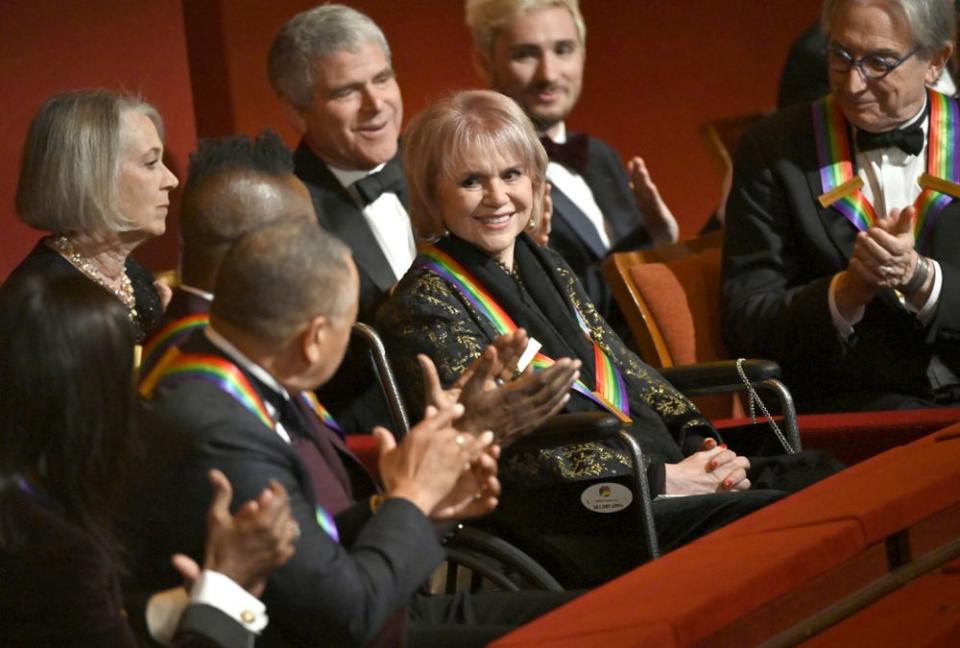
Having grown up near the border in Tucson, it must be so frustrating for you to see what’s going on in the area today. I’m sure you take it very personally.
When Trump announced he was going to run for president, I knew he’d win. This is the rise of Hitler, and Mexicans are the new Jews. I was right because he said that whole thing about Mexicans being rapists and murderers and drug dealers.
I went back to Tucson to live for 10 years in the ’90s, and the fence went up during that time. It was like stealth. I wasn’t even aware of it, and all of a sudden it was there. And now they’ve added walls of barbed wire, concertina wire, on the Mexican side. So dogs are getting tangled up in it and children get hurt on it. But it doesn’t keep anybody from going across. People mostly fly in and overstay their visas, or they come in by boat — can’t put a wall on the beach — or they tunnel under. There are lots of ways you can climb over it. What it’s going to mainly do is interrupt wildlife in a really profound way. It’s going to have horrible ecological effects on the desert.
[The U.S. government] will have to take property by eminent domain. People say they don’t want the government telling them what to do. Now they’re told, “Sorry, we’re building a fence through your ranch, and half of it’s going to belong to Mexico.” It’s really awful. It cuts off services to one side or the other. One side flourishes and the other side dies. But which side is going to die? It might turn out to be the United States.
The culture of the region means a great deal to you — you’ve made several albums of traditional Mexican Mariachi music [Canciones de Mi Padre (1987), Mas Canciones (1991) and Frenesí (1992)]. What was the border community like when you were growing up there?
It was half cowboy country and half suburban. I mean, in my lifetime, the suburbs caught up with where we were. We were on a rural route on a dirt road. And in my lifetime, it became a paved road and they built a subdivision across from that paved road. But we didn’t see them. I lived on the last 10 acres of my grandfather’s cattle ranch. We had horses and chickens and dogs and cats and ducks. It was like growing up on a farm except we didn’t have to farm. They had a big vegetable garden we had to irrigate, but my father made his living with a big hardware business downtown. We sold all kinds of farm equipment, so the farmers would come from both sides of the border to shop there because we had the highest quality stuff. We had a really strong business and personal relations with people on both sides of the border. We always went back and forth. We’d go to Mexico for lunch and to shop in the little stores down there. They had really nice stores [in] Nogales. And then when people had baptisms or special picnics, whatever, we’d be invited. There’d be town balls, and we’d go to their balls. We’d get dressed up and go across the line and go to a party. And the food was the same on both sides of the border. There was no fence.
What did you want out of life at that time? What were your dreams growing up?
I wanted a really pretty pinto horse, and I wanted an Arabian [horse]. But I wanted to sing, mainly. I wanted to sing on stages. My brother was a singer in the Tucson Arizona Boys Choir and they played a really pretty little concert hall in Tucson. I always thought I wanted to sing on concert stages, not clubs.
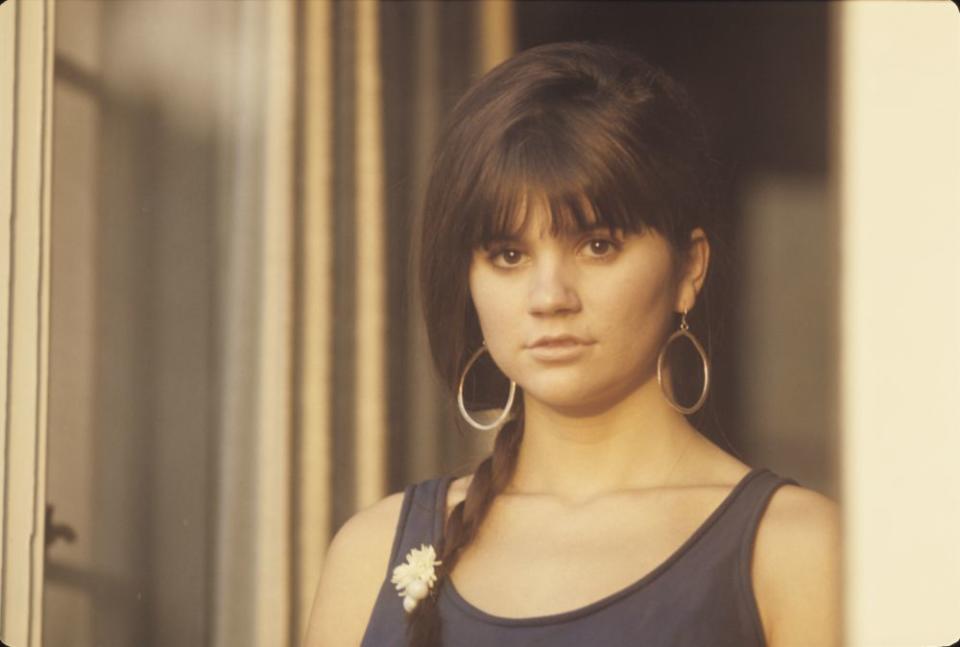
Was there a moment when you knew music was what you wanted to do with your life?
I knew in first grade because I didn’t do very well in arithmetic. The first grading period I got a D in arithmetic. And I thought, “Well, I won’t need to have arithmetic. I’m going to be a singer!” I got straight As after that, but arithmetic was tough there at the beginning. I knew I was a singer then. I didn’t think about being famous or being a star. I just thought about singing.
What were some of the biggest challenges of being a public figure? Did you ever find it hindered what you wanted to do?
I just avoided it. Before cell phones, you could avoid it. I didn’t show up for galas or big openings or anything like that where there were press; never did. I just stayed where I was. It was annoying because it takes away your ability to observe other people because they’re always looking at you. I have my anonymity back now so I can check out the room when I go into it.
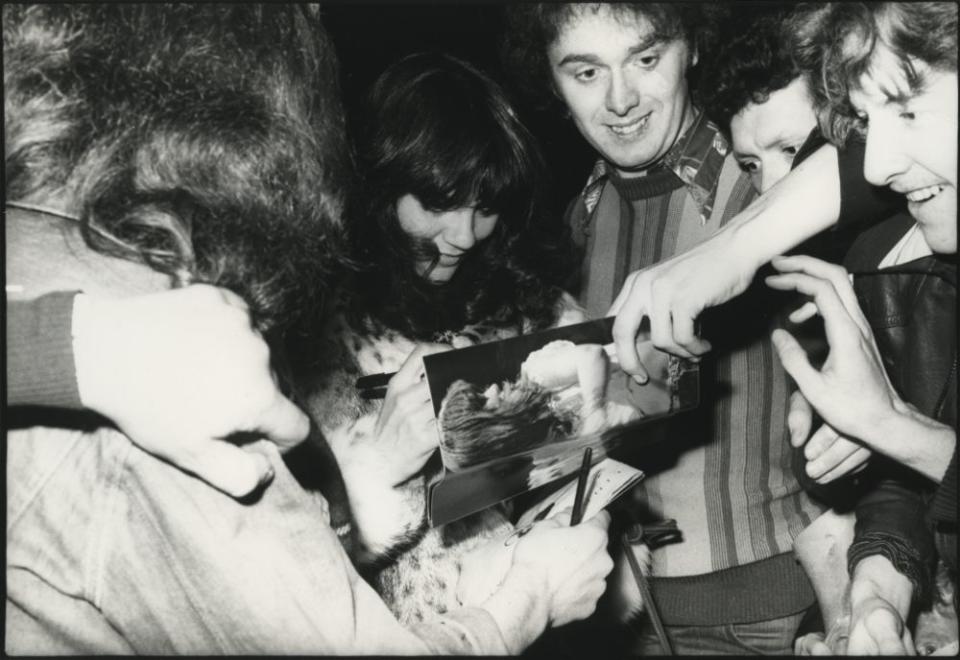
Today there are so many singers who foster relationships with fans on social media. Do you think that people’s knowledge of the singer and their personal life enhances the experience of hearing them sing because you know the personal emotion that they’re putting into it? Or do you think that’s just a distraction bordering on voyeurism?
It depends on how they think and what they think. I love Woody Allen movies, for instance. I don’t need to know about his personal life. I think Match Point is one of the best movies I’ve ever seen and I don’t want anything to get in the way of that. But there are inconvenient little truths that come out from time to time. I wouldn’t want to know a minute-by-minute account of Tolstoy or Dostoevsky’s life. Dostoevsky lived a life of chaos, and Tolstoy lived a life of over-controlling. Edith Wharton had some casual racist remarks in her books. I don’t want to know about that. I just think she’s a great writer.
You’re a very avid reader. What are you reading right now?
I’m reading a biography of Norman Rockwell. It was written by his son from recordings that he did, with a lot of extra pictures. It’s really great. For instance, he was given a contract by Look magazine and it said that he couldn’t show black people except in subservient positions. He got around it all the time. He’d stick them in other positions. He’d have to sneak it, but he did. Jim Crow was such a real thing up until the ’70s, really. Still is in the South.
Did you see a lot of that firsthand when you were touring?
Well, we didn’t see people firsthand. A tour bus is a very insular thing. It’s like the beginning of Heart of Darkness, by Joseph Conrad, when they talk about how provincial sailors’ lives are. You’re there on the ship all the time with your shipmates and then the times when they do go into port, the port in India is the same as the port in China. It’s got the same grogshops, the same hookers. They don’t penetrate into the culture. It’s really a very insular life. We went to the hotel, we went to the sound check, we did the show and then we left town.
Was that fun and exciting for you at the time or was it lonely? Or possibly a little bit of both?
I hated touring. It was just too hard. I did it for years, but I didn’t like it. It’s not a regular life. It encourages carelessness and waste because you always forget something in the last town, and you have to buy it new in the next town. And it’s not good for relationships unless the relationship is traveling with you, and then that’s not good for a whole bunch of other reasons. You lose touch with friends, and it’s hard to have an animal. I’ve always been an animal lover.
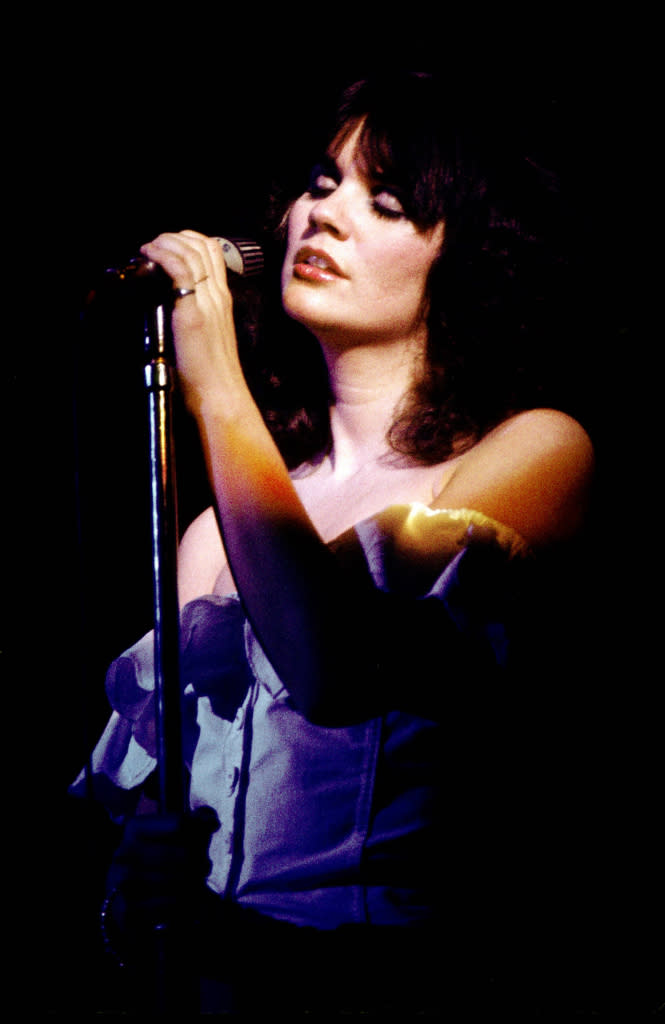
There’s such a vulnerability and authenticity to your work, even though the songs were usually written by other people. What attracts you in a piece of music? Is there always some kind of personal stake or personal connection you need to have to it?
It has to describe my life, at least one of the lines, and then I try to make the rest of it fit. But I have an urgent need to say that in that way.
One of my favorite songs of yours is “Try Me Again” from Hasten Down the Wind, which you wrote. Did you ever feel the desire to write more songs, or was that simply not how you wanted to express yourself?
I didn’t think of myself as a writer. Writers get up and they work every morning, or a lot of writers do. Songs just come through them. That song just came through me one day, and I went to the studio. I wrote it in the car, but it needed a bridge and another verse. And I sat up late to try to write it and nothing came. I got in the car the next day and went to the studio and the rest of it came. Andrew Gold helped me play the guitar for the bridge, but I wrote the chords and the music and the words. A little story of my life, then.
I wrote both the words and the music, but I didn’t think of myself as a writer. I didn’t feel like I had to come up with another song. That’s not my gift, you know? I mean, I could write a song. Anybody can write a song, but I can’t write a good song.
I recently read an interview you gave a number of years ago where you said, “Being able to sing songs about an emotion is to triumph over the emotion.” I thought that was such a beautiful expression, I was wondering if you could talk a little more about that.
You keep it from destroying you. I don’t know if you actually triumph over it, but art is there to help us express our feelings and deal with our emotions. You call artists for that. So it’s a way of expressing your feelings or telling a story. “This happened to me originally, and I have to tell you about this thing that happened.” It’s that kind of feeling.
Do you feel like the best singers have to be part actor to effectively convey that emotion?
No. [There’s] no acting because it has to be my story. I just see a movie of it, and I’m describing the movie.
Jackson Browne described you as an “auteur” in The Sound of My Voice documentary. Sounds like he got it right!
It was very generous of him. I recorded some of his songs early in my career when I didn’t know how to phrase, and I kind of butchered them. And I recorded one later on, “For a Dancer,” with Emmylou Harris, and that turned out better.
You’ve had some amazing duet partners — Emmylou and Dolly [Parton] and Aaron Neville. What’s it like to sing with somebody? What is that relationship like? Very intimate, I’d imagine.
Very intimate. First of all, I learned so much singing from Emmylou, and I learned so much emoting from Emmylou. When she sings, it’s like a prayer. It’s like your last desperate prayer for reprieve from the guillotine. And she helped me just lay it all out, and I learned a lot of musicianship from her, too.
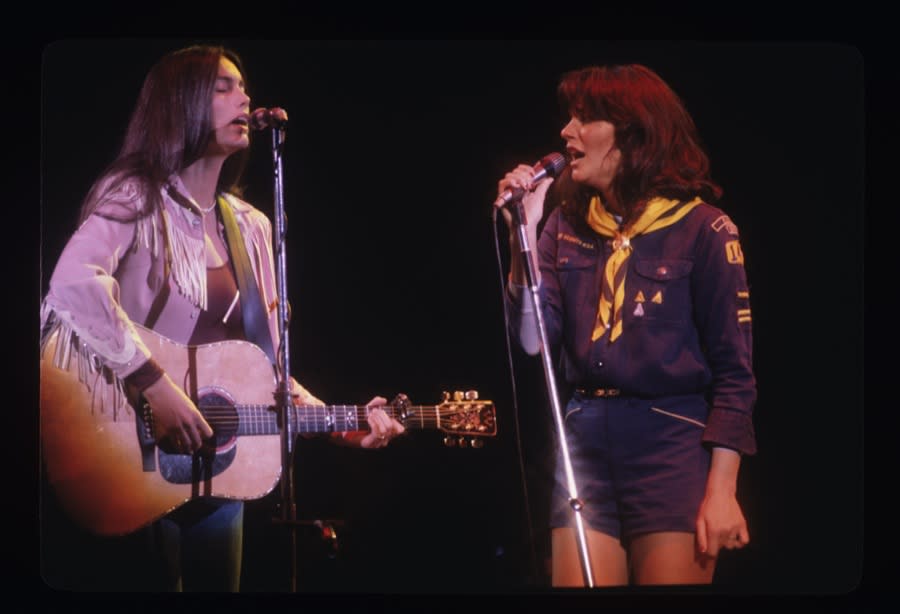
Relationships with somebody that you’ve sung with like that is as intimate as sex but it’s not sex. It’s different, but it’s very, very intimate. I mean, you feel like you know somebody. I feel that way about people that have written songs that I’ve recorded, like Jimmy Webb. I feel so close to him. He feels like a brother to me because I’ve sung those songs. He’s a great songwriter. I love his singing, too. I produced a record for him.
In addition to songs by Jimmy Webb and Jackson Browne, you’ve recorded songs by Gilbert & Sullivan, Rodgers & Hart, Thelonious Monk and Billy Strayhorn. Not the most obvious Top 40 material. Did that feel like a risky move at the time?
It felt urgent. People told me that it wouldn’t work. It wasn’t like I disagreed with them, I just didn’t hear them. I was listening to the music. I was making too much noise playing it, and they were songs that I wanted to sing. I thought they were better than the songs I was getting from contemporary writers.
There was another beautiful quote that you said earlier this year: “For me, there’s public music, private music, and secret music.” What’s your private music and what’s your secret music? Are you able to share?
I think that was something that came from [journalist and author] Pete Hamill, who said everyone has a public life, a private life, and a secret life. Public life’s open to anybody, but private life’s nobody’s business. It’s your life you never reveal.
I’m not telling you what my secret music is because it’s a secret. Private music is what people do just in their living room when they’re feeling a certain way. I recorded a song that was written for brass instruments to accompany. It was a little lament song about being deserted in Italian, but it really was for somebody to sit in their piano or sit in front of their glass harmonica and sing their sorrow. It didn’t necessarily need to be announced to the public.
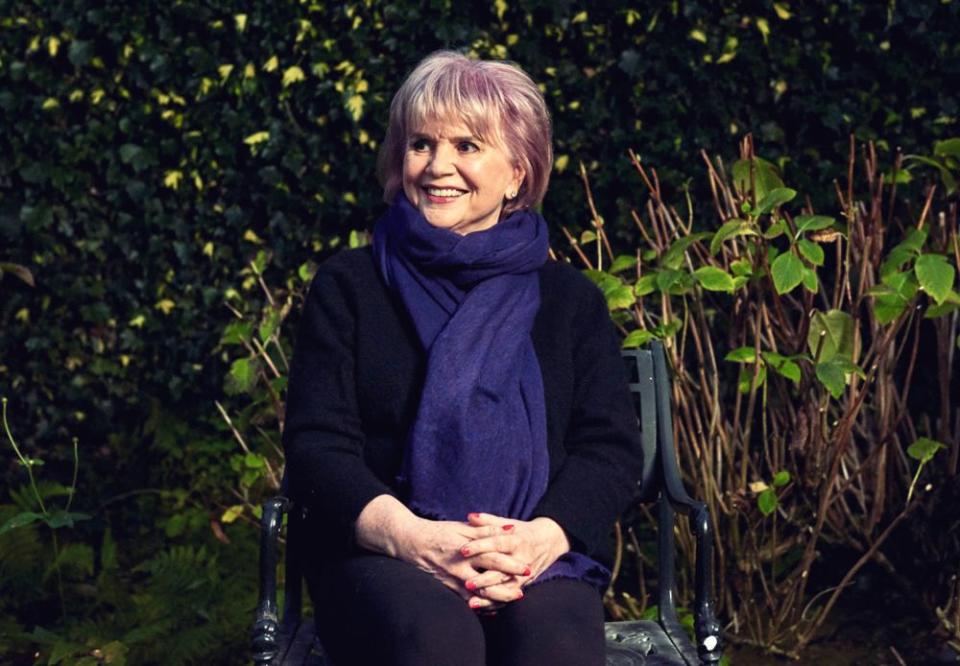
You’ve said that you still sing in your mind. What do you like to sing?
Sometimes I get to choose and sometimes I don’t. Like I might sing to a Jimmy Webb song or a J.D. Souther song, but sometimes a song runs in my head that I can’t get rid of, like, “Baby Shark, baby shark, baby shark do do do do, baby shark.” [laughs] You’re going to get that brain worm and you’re going to be singing “Baby Shark” in your brain all through the rest of the afternoon. I planted it there!
You know what? That’s true, but it’s in your voice, so I’m happy with that.

